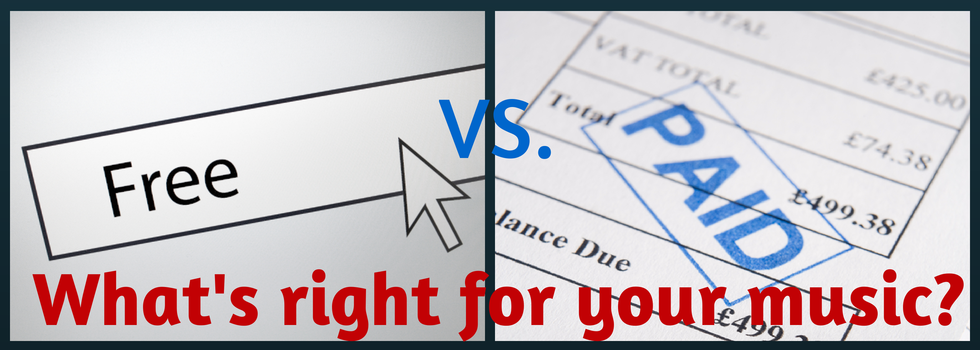Compare and Contrast: Charging for Tracks vs. Giving Music Away Free
The meteoric rise of digital music has completely altered the way that musicians attract attention, create fans, and profit from their art. The brutal reality for musicians in the modern world is that fewer and fewer people are buying albums. Most music fans use services like Spotify and Pandora to listen to all the music they can tolerate, without having to pay a dime for albums.
Musicians need to be able to make a living though, so how does one approach the subject of charging for music vs. giving it away for free? If every fanboy out there had access to free music all the time, artists would never make any money, right? But it’s also a proven fact that music fans go through a mental process of hear-like-buy. So which approach is the best? Should musicians charge for tracks, or give their music away free?
The Case for Charging
Musicians with a large fanbase and wide reach across the music industry view giving away music as free advertising, not to mention a great way to create viral buzz about upcoming albums. However, when music is given away for free it is often the last contact musicians have with a group of fans. The problem is that giving away music for free fails to convert casual listeners into loyal fans.
Charging for music, even if it is just a little bit, provides a source of revenue (no matter how small) for the artist. At the same time, it creates a sense of investment in the casual listener. If individuals pay for a track (or have to pay for a subscription to online listening services), they are invested in the music they are listening too. In this event, they are less likely to give a track one listen and then never repeat.
At the very least, it is a good idea to charge for tracks with “social currency.” When giving tracks away for “free,” collect the emails of individuals to create a mailing list. This provides a direct link for contact with fans and makes it easier to send out updates, concert info, and album release dates.
The Case for Giving it Away
The greatest argument in favor of giving music away is the mental process that all fans go through when interacting with an artist. No music fan simply picks out an album on iTunes or at a retailer and purchases it without hearing a single track. Fans will always hear music, like the artist, and buy the album. Hear-Like-Buy is a proven thought process that the vast majority of fans go through.
This means that giving away tracks for free (not entire albums) helps create a buzz. It plants the seed in the mind of music fans and gets them hooked on a certain sound, the rhythm of the music, or the lyrics in the song. When fans hear one song they like, they become interested in hearing more from a given album. When they discover they can’t live without the album, then they buy.
Musicians shouldn’t forget that tracks aren’t the only way to make money. Releasing tracks for free, either to individuals or to streaming music services online, creates buzz. It generates interest among fans and creates the potential for future revenue. Fans who listen to one song and become hooked are more likely to then buy merchandise, future albums, and attend concert events. There is money to be made everywhere, even if music has to be given away for free first.













One Comment
Music is not merely a brand building model. It is a source of healing and gives an endorphin lift to the human experience that is not about buying future merch. Buying is the pain- owning is the pleasure. It does more than “creates buzz”, it lifts us up,transforms our future selves and thereby saves lives. As such it is the most Wonderous Valued Commodity(WVC) there is in any Society. And it is work, and work has value too. If an artist is unable to sustain a free music model it is because it is a model that does not sustain the Artist.